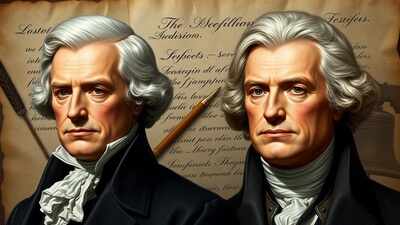
Life lessons students can learn from America’s founding fathers
When a group of young, idealistic revolutionaries declared independence in 1776, they weren’t just breaking away from a king—they were building a nation from scratch. Their vision wasn’t perfect.
But the values they lived, debated, and fought for—freedom, justice, curiosity, leadership—still resonate today.For students across the United States, July 4th isn’t just a celebration of history. It’s a reminder: you’re still writing the story they began.Here’s how America’s Founding Fathers, who were flawed, brilliant, and human, can still teach today’s students something vital about the kind of future worth building.
George Washington
Washington didn’t just lead a revolution—he redefined leadership. After winning the war, he had the popularity and power to rule indefinitely. Instead, he stepped away. Twice. His decision to walk away from the presidency after two terms was a statement: true leadership isn’t about control; it’s about service.For students today, Washington’s example matters more than ever. Whether you’re leading a project, organizing a campaign, or captaining a team, leadership isn’t about being the loudest voice.
It’s about being steady, fair, and knowing when to step back so others can rise. In an age of self-promotion, Washington reminds us that integrity still counts.
Benjamin Franklin
Inventor, diplomat, publisher, scientist—Franklin never stayed in one lane. He founded libraries, studied lightning, negotiated with kings, and questioned everything. What drove him? A deep, relentless curiosity.That same spirit is essential for students today.
Franklin’s life teaches us that curiosity isn’t just for the classroom—it’s a lifelong habit. Explore subjects that don’t appear on your syllabus. Follow questions that don’t have easy answers. The best ideas, Franklin knew, come when you combine the unexpected. In a world full of shortcuts, his legacy is a reminder to keep digging deeper.
Thomas Jefferson
Jefferson wrote the words that defined a revolution—"all men are created equal." The line wasn’t just a declaration; it became a standard that generations would fight to live up to. Jefferson himself didn’t meet that standard—but the power of his words sparked change far beyond his lifetime.For students, Jefferson’s legacy lies in the power of expression. In essays, speeches, social media posts, or protest signs—words shape the world. They inspire action. They frame how people see issues, values, and one another.
When students learn to write with clarity and conviction, they’re doing more than completing an assignment—they’re exercising one of democracy’s most important tools.
James Madison
Madison was never the loudest in the room—but he was always the most prepared. Known as the “Father of the Constitution,” he helped design the structure of government that still holds (and challenges) America today. Madison believed in debate, compromise, and systems that could adapt.That mindset is essential for today’s student changemakers. It’s not enough to be passionate—you have to know how things work. Whether you're trying to reform your school board or organize climate action, strategy matters. Madison teaches us that real change is sustained when it’s built on understanding, not just outrage.
John Adams
Adams did the unpopular thing—often. Most famously, he defended British soldiers after the Boston Massacre.
Not because he supported their cause, but because he believed in due process and justice. His actions weren’t politically convenient—but they were grounded in principle.
In today’s world of instant opinions and public pressure, Adams reminds us that doing the right thing is often uncomfortable. It’s easy to go with the crowd, but progress depends on people who are willing to stand alone when it counts. For students, that means holding onto your values—even when no one’s watching, and especially when it’s not easy.

 5 hours ago
52
5 hours ago
52




























 English (US)
English (US)